The Son Read online
Page 14
‘A shoeprint,’ she said.
‘The killer’s,’ he said.
‘Oh?’
‘Right, I think school’s out, Kefas.’
They turned round. It was Bjørnstad. He looked angry. Three CSOs were standing alongside him, including Nils with the ginger beard.
‘Almost done,’ Simon said and tried to get back inside. ‘I thought we would just—’
‘I think we’re done,’ Bjørnstad said, legs akimbo and blocking the path as he folded his arms across his chest. ‘I’ve found a flower in my bullet hole, and that’s a step too far. That’ll be all for today.’
Simon shrugged. ‘Fine, we’ve seen enough anyway to draw our own conclusions. Good luck finding your assassin, folks.’
Bjørnstad scoffed. ‘So you’re trying to impress your young student here by calling it an assassination?’ He turned to Kari. ‘I’m sorry that real life isn’t quite as exciting as the old boy here would like it to be. It’s just a bog-standard murder.’
‘You’re wrong,’ Simon said.
Bjørnstad rested his hand on his hip. ‘My parents taught me to respect my elders. I’m giving you ten seconds of respect, and then I want you gone.’ One of the CSOs tittered.
‘What nice parents,’ Simon said.
‘Nine seconds.’
‘The neighbour said she heard a shot.’
‘What about it?’
‘The properties here are large and there’s plenty of room between them. And the houses are well insulated. The neighbour wouldn’t have been able to hear something she could identify as a bang coming from inside the house. Outside, however . . .’
Bjørnstad leaned his head back as if to study Simon from another angle. ‘What’s your point?’
‘Mrs Iversen was about as tall as Kari here. And the only angle that fits with her standing up when she was shot and her entry wound being here –’ he pointed to Kari’s chest – ‘and her exit wound being on her back here, while the bullet ends up in the wall where I put the ox-eye daisy, is that the shooter was on a lower level than her, but that they both stood quite a long way from the kitchen wall. In other words, the victim was standing where we’re standing now, while the shooter was standing at the bottom of the steps, on the flagstones. That was how the neighbour heard the shot. However, the neighbour didn’t hear any screaming or noises preceding the shot, nothing to indicate commotion or resistance, so my guess is it happened quickly.’
Bjørnstad couldn’t help glancing back at his colleagues. He shifted his weight. ‘And then he dragged her inside, is that what you’re saying?’
Simon shook his head. ‘No, I think she stumbled backwards.’
‘And what makes you think that?’
‘You’re right that Mrs Iversen was house-proud. The only thing in this house hanging crooked is that picture there.’ The others turned to look where Simon was pointing. ‘Besides, there’s nail polish on the side of the picture frame closest to the door. It means she struck it as she staggered back inside; it fits with the chipped nail polish on her left middle finger.’
Bjørnstad shook his head. ‘If she was shot in the doorway and walked backwards, there would have been bloodstains from the exit wound along the hallway.’
‘And there were,’ Simon said, ‘but the killer cleaned them up. Like you said yourself, there were no fingerprints on the door handle. Not even the family’s. Not because Agnete Iversen started spring-cleaning seconds after her husband and son had touched the handle on their way out, but because the killer didn’t want to leave us any evidence. And I’m quite sure that the reason he mopped up the blood on the floor was that he had stepped in it and didn’t want to leave shoeprints. So he also wiped down the soles of his shoes.’
‘Is that right?’ Bjørnstad said, still leaning his head backwards, but no longer grinning quite so broadly. ‘And you surmise all this out of thin air?’
‘When you dry the soles of your shoes, you don’t remove the blood in between the ridges in the pattern of the sole,’ Simon said, looking at his watch. ‘But that blood will come out if, for example, you stand on a thick rug whose fibres get into the sole pattern and soak up the blood. In the bedroom you’ll find a rectangular bloodstain in the carpet. I think your blood technician will agree with me, Bjørnstad.’
In the silence that followed, Kari heard the sound of a car being stopped by police officers further up the road. There were agitated voices, one of them belonging to a young man. The victim’s husband and son.
‘Whatever,’ Bjørnstad said with forced indifference. ‘Ultimately, it doesn’t matter where the victim was shot, this is a burglary gone wrong, not an assassination. And it sounds as if someone will be here shortly who can confirm that jewellery is missing from the jewellery box.’
‘Jewellery is all well and good,’ Simon said, ‘but if I’d been the burglar, I would have taken Agnete Iversen inside and forced her to show me where the real valuables are kept. Made her give me the combination to the safe which every idiot burglar knows a house like this will have. But instead he shoots her right here where the neighbours can hear. Not because he panics – the way he removed evidence shows how callous he is. No, he does it because he knows he won’t be spending very long in the house, that he’ll be long gone by the time the police arrive. Because he’s not there to steal very much, is he? Just enough so that an inexperienced investigator with nice parents will swiftly conclude that it’s a burglary gone wrong and not look too closely for the real motive.’
Simon had to admit that he enjoyed the silence and the sudden colour in Bjørnstad’s face. Deep down Simon Kefas was a simple soul, but he wasn’t vindictive. Though he was sorely tempted, he spared his young colleague his parting shot: school’s out, Bjørnstad.
Given time and experience it was always possible that Åsmund Bjørnstad might one day make a good investigator. Humility was also something good investigators had to learn.
‘Very enjoyable theory, Kefas,’ Bjørnstad said. ‘I’ll keep it in mind. But time is passing and . . .’ Short smile. ‘. . . perhaps you should be on your way?’
‘Why didn’t you tell him everything?’ Kari asked while Simon carefully manoeuvred the car around the sharp bends coming down from Holmenkollåsen.
‘Everything?’ Simon said, feigning innocence. Kari had to laugh. Simon was doing his eccentric old-man act.
‘You knew that the shell had landed somewhere in that flower bed. You didn’t find a shell, but you did find a shoeprint. Which you photographed. And the soil there matched the soil in the hallway?’
‘Yes.’
‘So why not give him that information?’
‘Because he’s an ambitious investigator whose ego is bigger than his team spirit, so it’s better if he discovers it himself. He’ll be more motivated if he feels that it’s his evidence and not mine they’re following up when they start looking for a man who takes size 8½ shoes and who picked up an empty shell in that rose bed.’
They stopped for a red light at Stasjonsveien. Kari strangled a yawn. ‘And how did you gain such insight into how an investigator like Bjørnstad thinks?’
Simon laughed. ‘Easy. I was young and ambitious once.’
‘But ambition fades in time?’
‘Some of it does, yes.’ Simon smiled. A wistful smile, Kari thought.
‘Is that why you stopped working for the Serious Fraud Office?’
‘What makes you say that?’
‘You were management. Chief Inspector in charge of a large team. They’ve let you keep your title in Homicide, but the only person you’re in charge of is me.’
‘Yep,’ Simon said, crossing the junction and continuing towards Smestad. ‘Overpaid, overqualified, left over. Or just over.’
‘So what happened?’
‘You don’t want to—’
‘Yes, I do.’
They drove on in a silence which Kari deemed to be to her advantage so she kept her mouth shut. Even so, they had almost reached Maj
orstua before Simon began.
‘I had uncovered a money laundering operation. We’re talking serious money. People in high places. My fellow senior officers thought that my investigation and I represented a big risk. That I didn’t have enough evidence, that we would be hung out to dry if we pursued the inquiry but failed to secure a conviction. We’re not talking your usual common criminal, the suspects were powerful people, people who’ll fight back using the very same system the police use. My colleagues were afraid that, even if we won, we would pay for it later, there would be a backlash.’
Another silence. Which lasted till they reached Frogner Park where Kari finally lost patience.
‘So they kicked you out just because you’d launched a controversial inquiry?’
Simon shook his head. ‘I had a problem. Gambling. Or, to use the technical expression, ludomania. I bought and sold shares. Not many. But when you work for the Serious Fraud Office . . .’
‘. . . then you have access to inside information.’
‘I never traded in shares I had information about, but I still broke the rules. And they worked that for all it was worth.’
Kari nodded. They weaved their way towards the city centre and the Ibsen Tunnel. ‘And then?’
‘I no longer gamble. Nor do I bother anyone.’ Again this sad, resigned smile.
Kari thought about her plans for this evening. Go to the gym. Dinner with her in-laws. A viewing in Fagerborg. And heard herself ask the question which must have come from another, almost subconscious part of her brain: ‘Why did the killer take the shell with him?’
‘Every shell has a serial number, but it rarely leads us to the killer,’ Simon said. ‘He might have been scared that the shell would have his prints on it, but I think that this killer would have already thought of that, that he would have worn gloves when he loaded the gun. I think we can conclude that his gun is relatively recent, produced in the last few years.’
‘Oh?’
‘For ten years now it has been mandatory for handgun manufacturers to engrave a serial number on the weapon’s firing pin so that it leaves a kind of unique fingerprint when it hits the cap on the shell. It means all we need to identify the owner is an empty shell and the Firearms Register.’
Kari struck out her lower lip and nodded slowly. ‘OK, I get that. What I don’t get is why he wanted it to look like a robbery.’
‘Just like he’s scared of the evidence on the shell, he’s scared that if we know the real motive, it would lead us to him.’
‘Well, then it’s straightforward,’ Kari said, but she was really thinking about the Fagerborg property ad. It had stated that the flat had two balconies, one east-facing, one west-facing.
‘Oh?’ Simon said.
‘The husband,’ Kari said. ‘Every husband knows that he’ll be the prime suspect unless he can make it look as if his wife was killed for another reason. A burglary, for instance.’
‘Another reason apart from?’
‘Apart from jealousy. Love. Hate. Is there anything else?’
‘No,’ Simon said. ‘There isn’t.’
18
EARLY THAT AFTERNOON a shower of rain washed over Oslo without noticeably cooling down the city. And when the sun scorched its way through the layer of clouds, it was as if it wanted to make up for lost time by baking the capital in a white light which caused steam to rise from the roofs and streets.
Louis woke up when the sun was so low in the sky that the beams hit his eyes. He peered at the world. At the people and the cars going to and fro in front of him and his begging bowl. It had been a reasonably lucrative business until some years ago when Romanian gypsies started coming to Norway. A few had turned into many. Which in turn had become a swarm. A stealing, begging and swindling swarm of locusts. And like all vermin they must be fought with every possible means. It was Louis’s simple opinion on the matter, that Norwegian beggars – just like Norwegian shipping companies – were entitled to government protection against foreign competition. As things were now, he was having to rely on stealing; something which was not only exhausting, but frankly beneath his dignity.
He heaved a sigh and prodded his begging bowl with a filthy finger. Heard there was something in the bowl. Not coins. Banknotes? In which case he had better pocket them before one of the gypsies nicked them. He looked down in the bowl. Blinked twice. Then he picked it up. It was a watch. A lady’s watch, it would seem. A Rolex. It was fake, obviously. But heavy. Very heavy. Did people really enjoy wearing such heavy objects around their wrists? He had heard that watches like that were water-resistant to a depth of fifty metres, something which was sure to come in handy if you went swimming while wearing a watch like this. Could it be . . .? There were some weirdos around, no doubt about it. Louis looked up and down the street. He knew the watchmaker on the corner of Stortingsgata; they had been at school together. Perhaps he should . . .
Louis staggered to his feet.
Kine was standing next to her shopping trolley, smoking a cigarette. But when the green man lit up and the other pedestrians around her started walking, she stayed put. She had changed her mind. She wasn’t going to cross the street today. She stayed where she was, finishing her cigarette. She had nicked the trolley from IKEA a long, long time ago. Simply rolled it out of the store and into the van in the car park. Driven that and a Hemnes bed, a Hemnes table and some Billy bookcases to a place she thought was their future. Her future. He had fixed the furniture before preparing a fix for both of them. He was dead now, she wasn’t. And she was no longer a junkie. She was all right. But it was a long time since she last slept in the Hemnes bed. She trod on the cigarette and grabbed the handle of the IKEA trolley. She noticed that someone – probably one of the other pedestrians – had left a plastic bag on top of the filthy woollen blanket in her trolley. Irritated, she snatched the bag; it wasn’t the first time people had mistaken the trolley with all her earthly possessions for a common bin. She turned round; she could tell the location of every rubbish bin in Oslo with her eyes shut and knew there was one right behind her. But then she stopped. The weight of the plastic bag stirred her curiosity. She opened it. Plunged her hand in and brought its contents up into the afternoon sunshine. It glittered and sparkled. Jewellery. Necklaces and a ring. The pendants were diamonds and the ring was solid gold. Real gold, real diamonds. Kine was almost certain; she had seen gold and diamonds before. After all, the furniture in her childhood home hadn’t been self-assembly.
Johnny Puma widened his eyes, felt the terror creep up on him and turned over in the bed. He hadn’t heard anyone come in, but now he could hear heavy breathing and moaning. Was Coco in the room? No, this panting sounded more like someone screwing than someone collecting a debt. A couple had been allowed to stay at the centre once; the management must have thought that the two of them needed each other so much that they had made an exception to the men-only rule. It was certainly true that the man had needed the woman – she had financed their heroin addiction by screwing her way from room to room until the management said enough was enough and threw her out.
It was the new arrival. He was lying on the floor, facing away from Johnny, and Johnny could faintly hear a synthetic, rhythmic track and a robotic, monotonous voice coming from the earphones he was wearing. The boy was doing push-ups. In his heyday Johnny could have done a hundred, using just the one arm. The boy was strong, no doubt about it, but he was struggling with stamina, his back was sagging already. In the light that seeped in between the curtains and hit the wall, he saw a photo which the boy must have pinned up. A man in a police uniform. And he saw something else, on the windowsill. A pair of earrings. They looked expensive; he wondered where the boy had stolen them.
If they were as expensive as they looked, they might just solve Johnny’s problem. Rumour had it Coco was moving out of the hostel tomorrow and that his runners were busy collecting any debts he was owed. It left Johnny with only a few hours to scrape some money together. He had considered burgling one of t
he apartments in Bislett as many people were away on holiday. Ring the doorbell and see where there was no answer. He just had to summon up the energy first. But this was simpler and safer.
He wondered if he could sneak out of bed and snap up the earrings without getting noticed, but dropped the idea. Stamina or no stamina, he risked a beating. The very idea was laughable. But he could always try to distract the newcomer, make up an excuse to get him out of the room and then strike. Suddenly Johnny found himself looking into the boy’s eyes. He had turned round and was doing sit-ups. He smiled.
Johnny gestured that he wanted to say something and the boy pulled the earphones out. Johnny heard the lyrics ‘. . . now I’m clean’ before he started to talk.
‘Would you help me down to the cafe, mate? You’ll need something to eat yourself after that workout. If the body can’t burn fat or carbohydrates, it’ll start eating muscle, you know. And all your hard work will have been for nothing.’
‘Thanks for the tip, Johnny. I just need to shower first, but you get yourself ready.’ The boy stood up. Slipped the earrings into his pocket and headed out of the door in the direction of the communal showers.
Damn! Johnny closed his eyes. Did he have the energy? Yes, he had to. Only two minutes. He counted the seconds. Then he sat up on the edge of the bed. Pushed off. Stood up. Grabbed his trousers from the chair. He was putting them on when there was a knock on the door. The boy must have forgotten his keys. Johnny limped over to the door and opened it. ‘How many times do I have to—’
A clenched fist wearing knuckledusters landed right in Johnny Puma’s forehead and he fell backwards.
The door opened fully and Coco and two of his boys entered. The boys grabbed his arms and Coco headbutted Johnny so the back of his head slammed into the top bunk. When he looked up again, he was staring right into Coco’s ugly, heavily mascaraed eyes and the gleaming point of a stiletto.
‘I’m busy man, Johnny,’ Coco said in broken Norwegian. ‘The others have money, but still they don’t pay. You have no money, I know that, so you will be example.’

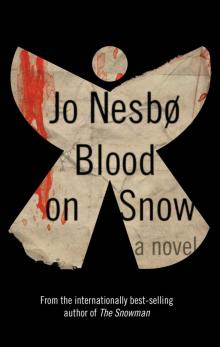 Blood on Snow: A novel
Blood on Snow: A novel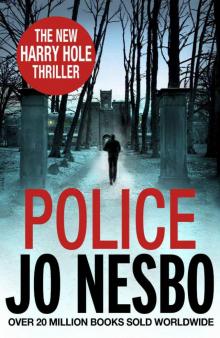 Police: A Harry Hole thriller (Oslo Sequence 8)
Police: A Harry Hole thriller (Oslo Sequence 8) Doctor Proctor's Fart Powder: The Great Gold Robbery
Doctor Proctor's Fart Powder: The Great Gold Robbery Bubble in the Bathtub
Bubble in the Bathtub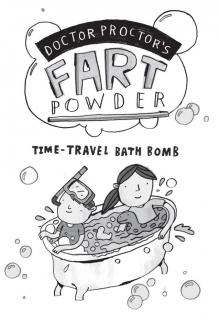 Doctor Proctor's Fart Powder: Time-Travel Bath Bomb
Doctor Proctor's Fart Powder: Time-Travel Bath Bomb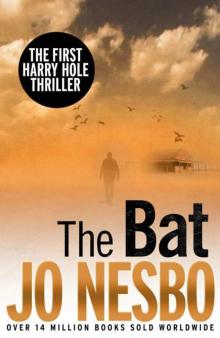 The Bat
The Bat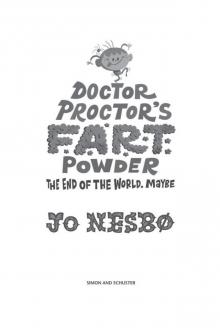 Doctor Proctor's Fart Powder: The End of the World. Maybe.
Doctor Proctor's Fart Powder: The End of the World. Maybe. Silent (but Deadly) Night
Silent (but Deadly) Night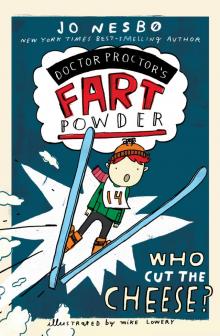 Who Cut the Cheese?
Who Cut the Cheese? Headhunters
Headhunters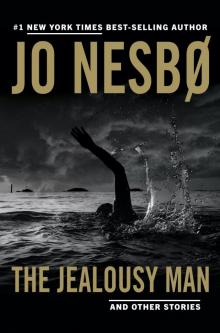 The Jealousy Man and Other Stories
The Jealousy Man and Other Stories Harry Hole Mysteries 3-Book Bundle
Harry Hole Mysteries 3-Book Bundle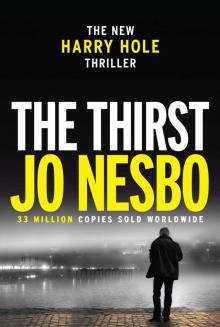 The Thirst
The Thirst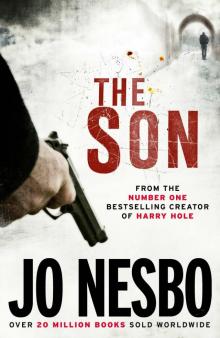 The Son
The Son The Redeemer
The Redeemer The Kingdom
The Kingdom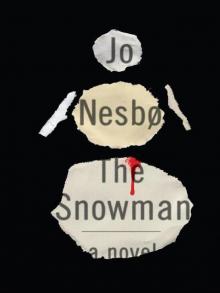 The Snowman
The Snowman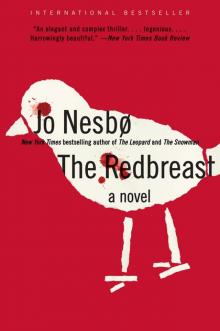 The Redbreast
The Redbreast Phantom
Phantom Macbeth
Macbeth The Leopard
The Leopard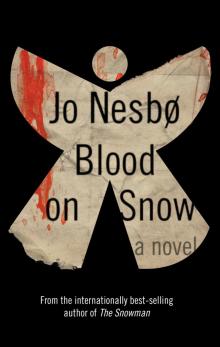 Blood on Snow
Blood on Snow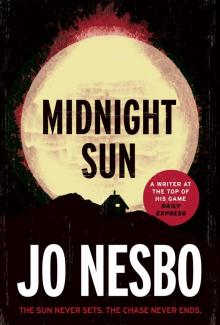 Midnight Sun
Midnight Sun The Redbreast (Harry Hole)
The Redbreast (Harry Hole)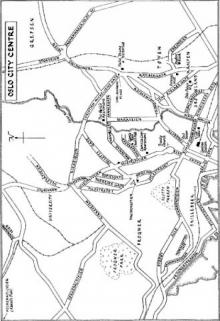 The Devil's Star
The Devil's Star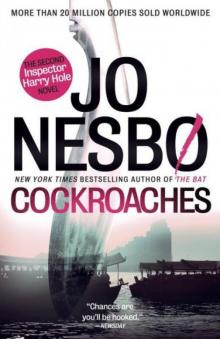 Cockroaches
Cockroaches The Magical Fruit
The Magical Fruit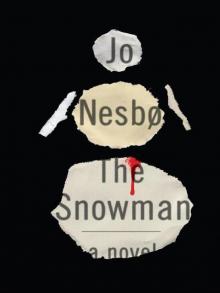 The Snowman: A Harry Hole Novel
The Snowman: A Harry Hole Novel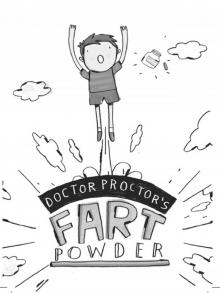 Doctor Proctor's Fart Powder
Doctor Proctor's Fart Powder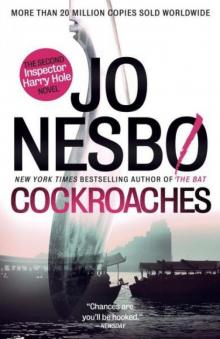 The Cockroaches
The Cockroaches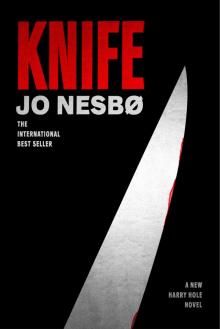 Knife
Knife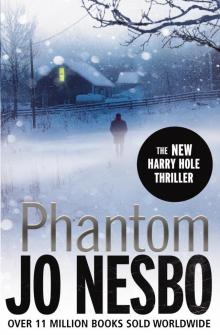 Phantom hh-9
Phantom hh-9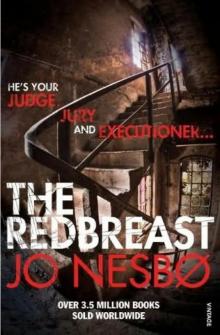 The Redbreast hh-3
The Redbreast hh-3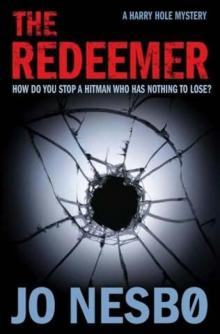 The Redeemer hh-6
The Redeemer hh-6 The Leopard hh-8
The Leopard hh-8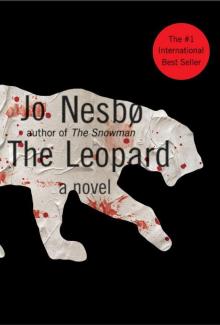 The Leopard: An Inspector Harry Hole Novel
The Leopard: An Inspector Harry Hole Novel The Great Gold Robbery
The Great Gold Robbery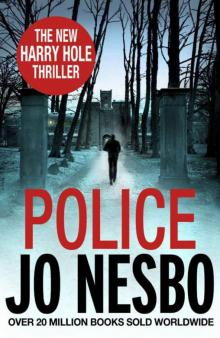 Police hh-10
Police hh-10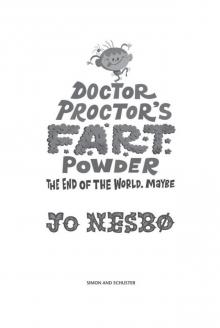 The End of the World. Maybe
The End of the World. Maybe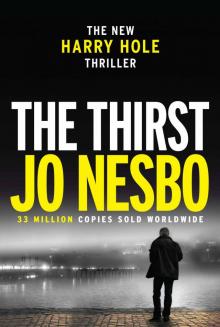 The Thirst: Harry Hole 11
The Thirst: Harry Hole 11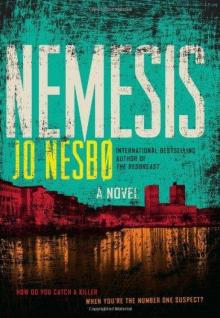 Nemesis - Harry Hole 02
Nemesis - Harry Hole 02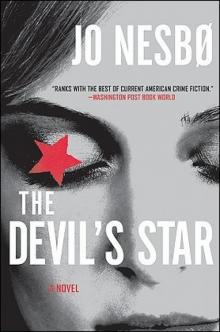 The Devil's star hh-5
The Devil's star hh-5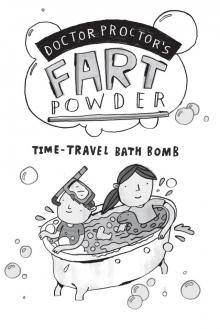 Time-Travel Bath Bomb
Time-Travel Bath Bomb